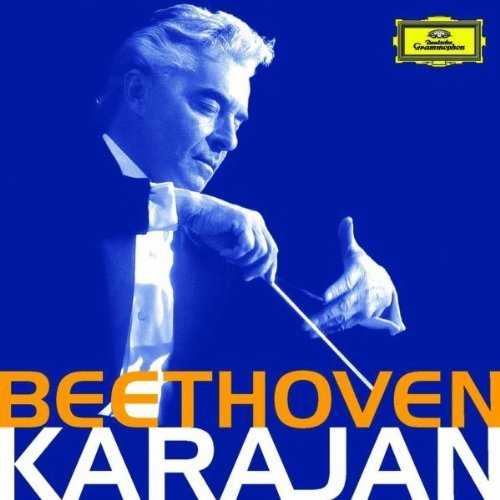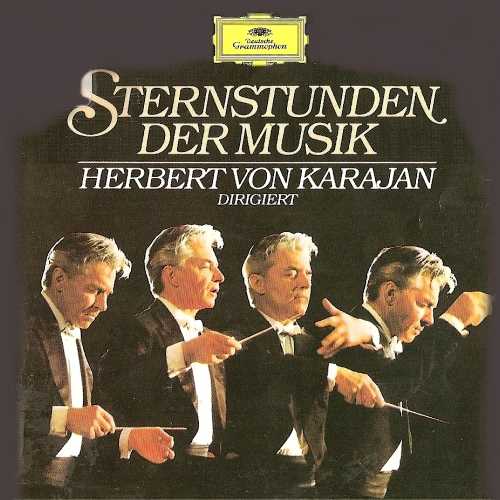
Composer: Ludwig van Beethoven
Orchestra: Berliner Philharmoniker
Conductor: Herbert von Karajan
Audio CD
Number of Discs: 13 CD box set
Format: FLAC (image+cue)
Label: Deutsche Grammophon
Size: 3.66 GB
Recovery: +3%
Scan: yes
Disc 01
01. Symphony No.1 in C, Op.21 – 1. Adagio molto – Allegro con brio
02. Symphony No.1 in C, Op.21 – 2. Andante cantabile con moto
03. Symphony No.1 in C, Op.21 – 3. Menuetto (Allegro molto e vivace)
04. Symphony No.1 in C, Op.21 – 4. Finale (Adagio – Allegro molto e vivace)
05. Symphony No.2 in D, Op.36 – 1. Adagio molto – Allegro con brio
06. Symphony No.2 in D, Op.36 – 2. Larghetto
07. Symphony No.2 in D, Op.36 – 3. Scherzo (Allegro)
08. Symphony No.2 in D, Op.36 – 4. Allegro molto
Disc 02
01. Symphony No.3 in E flat, Op.55 -“Eroica” – 1. Allegro con brio
02. Symphony No.3 in E flat, Op.55 -“Eroica” – 2. Marcia funebre (Adagio assai)
03. Symphony No.3 in E flat, Op.55 -“Eroica” – 3. Scherzo (Allegro vivace)
04. Symphony No.3 in E flat, Op.55 -“Eroica” – 4. Finale (Allegro molto)
05. Symphony No.8 in F, Op.93 – 1. Allegro vivace e con brio
06. Symphony No.8 in F, Op.93 – 2. Allegretto scherzando
07. Symphony No.8 in F, Op.93 – 3. Tempo di menuetto
08. Symphony No.8 in F, Op.93 – 4. Allegro vivace
Disc 03
01. Symphony No.4 in B flat, Op.60 – 1. Adagio – Allegro vivace
02. Symphony No.4 in B flat, Op.60 – 2. Adagio
03. Symphony No.4 in B flat, Op.60 – 3. Allegro vivace
04. Symphony No.4 in B flat, Op.60 – 4. Allegro ma non troppo
05. Symphony No.7 in A, Op.92 – 1. Poco sostenuto – Vivace
06. Symphony No.7 in A, Op.92 – 2. Allegretto
07. Symphony No.7 in A, Op.92 – 3. Presto – Assai meno presto
08. Symphony No.7 in A, Op.92 – 4. Allegro con brio
Disc 04
01. Symphony No.5 in C minor, Op.67 – 1. Allegro con brio
02. Symphony No.5 in C minor, Op.67 – 2. Andante con moto
03. Symphony No.5 in C minor, Op.67 – 3. Allegro
04. Symphony No.5 in C minor, Op.67 – 4. Allegro
05. Symphony No.6 in F, Op.68 -“Pastoral” – 1. Erwachen heiterer Empfindungen bei der Ankunft auf dem Lande: Allegro ma non troppo
06. Symphony No.6 in F, Op.68 -“Pastoral” – 2. Szene am Bach: (Andante molto mosso)
07. Symphony No.6 in F, Op.68 -“Pastoral” – 3. Lustiges Zusammensein der Landleute (Allegro)
08. Symphony No.6 in F, Op.68 -“Pastoral” – 4. Gewitter, Sturm (Allegro)
09. Symphony No.6 in F, Op.68 -“Pastoral” – 5. Hirtengesang. Frohe und dankbare Gefühle nach dem Sturm: Allegretto
Disc 05
01. Symphony No.9 in D minor, Op.125 – “Choral” – 1. Allegro ma non troppo, un poco maestoso
02. Symphony No.9 in D minor, Op.125 – “Choral” – 2. Molto vivace
03. Symphony No.9 in D minor, Op.125 – “Choral” – 3. Adagio molto e cantabile
04. Symphony No.9 in D minor, Op.125 – “Choral” – Excerpt from 4th movement – 4. Presto
05. Symphony No.9 in D minor, Op.125 – “Choral” / 4. – “O Freunde nicht diese Töne”
Disc 06
01. The Creatures of Prometheus, Op.43 – Overtura. Adagio – Allegro molto con brio
02. “King Stephen or Hungary’s First Benefactor”, Op.117
03. The Ruins of Athens, Op.113
04. Overture “Coriolan”, Op.62
05. Overture “Nameday”, Op.115
06. Overture “The Consecration of the House”, Op.124
Disc 07
01. Overture “Leonore No.1”, Op.138
02. Overture “Leonore No.2”, Op.72a
03. Overture “Leonore No.3”, Op.72b
04. Overture “Fidelio”, Op.72c
05. Grosse Fuge in B flat, Op.133 – Orchestral Version
Disc 08
01. Music to Goethe’s Tragedy “Egmont” op.84
02. Egmont – Complete Incidental Music, Op.84 – 1. Lied: “Die Trommel gerühret”
03. Egmont – Complete Incidental Music, Op.84 – 2. Zwischenakt: Andante
04. Egmont – Complete Incidental Music, Op.84 – 3. Zwischenakt: Larghetto
05. Egmont – Complete Incidental Music, Op.84 – 4. Lied: “Freudvoll und leidvoll”
06. Egmont – Complete Incidental Music, Op.84 – 5. Zwischenakt: Allegro – Marcia
07. Egmont – Complete Incidental Music, Op.84 – 6. Zwischenakt: Poco sostenuto e risoluto
08. Egmont – Complete Incidental Music, Op.84 – 7. Clärchens Tod
09. Egmont – Complete Incidental Music, Op.84 – 8. Melodram: “Süßer Schlaf”
10. Egmont – Complete Incidental Music, Op.84 – 9. Siegessymphonie: Allegro con brio
11. Wellington’s Victory or the Battle Symphony, Op.91
12. Musik zu einem Ritterballett WoO 1 (1790-91) – 1. Marsch
13. Musik zu einem Ritterballett WoO 1 (1790-91) – 2. Deutscher Gesang. Allegro moderato
14. Musik zu einem Ritterballett WoO 1 (1790-91) – 3. Jagdlied. Allegretto
15. Musik zu einem Ritterballett WoO 1 (1790-91) – Deutscher Gesang (da capo)
16. Musik zu einem Ritterballett WoO 1 (1790-91) – 4. Romanze (Minnelied). Andantino
17. Musik zu einem Ritterballett WoO 1 (1790-91) – Deutscher Gesang (da capo)
18. Musik zu einem Ritterballett WoO 1 (1790-91) – 5. Kriegslied. Allegro assai con brio
19. Musik zu einem Ritterballett WoO 1 (1790-91) – Deutscher Gesang (da capo)
20. Musik zu einem Ritterballett WoO 1 (1790-91) – 6. Trinklied. Allegro con brio
21. Musik zu einem Ritterballett WoO 1 (1790-91) – Deutscher Gesang (da capo)
22. Musik zu einem Ritterballett WoO 1 (1790-91) – 7. Deutscher Tanz. Walzer
23. Musik zu einem Ritterballett WoO 1 (1790-91) – 8. Coda. Allegro vivace
24. “Gratulations-Menuett” in E flat major for Orchestra WoO 3 – Tempo di Menuetto quasi Allegretto
25. March for Military Music in F major “Yorck March” WoO 18
Disc 09
01. Piano Concerto No.1 in C major, Op.15 – 1. Allegro con brio
02. Piano Concerto No.1 in C major, Op.15 – 2. Largo
03. Piano Concerto No.1 in C major, Op.15 – 3. Rondo (Allegro scherzando)
04. Concerto for Piano, Violin, and Cello in C, Op.56 – 1. Allegro
05. Concerto for Piano, Violin, and Cello in C, Op.56 – 2. Largo – attacca
06. Concerto for Piano, Violin, and Cello in C, Op.56 – 3. Rondo alla Polacca
Disc 10
01. Piano Concerto No.2 in B flat major, Op.19 – 1. Allegro con brio
02. Piano Concerto No.2 in B flat major, Op.19 – 2. Adagio
03. Piano Concerto No.2 in B flat major, Op.19 – 3. Rondo (Molto allegro)
04. Piano Concerto No.4 in G, Op.58 – 1. Allegro moderato
05. Piano Concerto No.4 in G, Op.58 – 2. Andante con moto
06. Piano Concerto No.4 in G, Op.58 – 3. Rondo (Vivace)
Disc 11
01. Piano Concerto No.3 in C minor, Op.37 – 1. Allegro con brio
02. Piano Concerto No.3 in C minor, Op.37 – 2. Largo
03. Piano Concerto No.3 in C minor, Op.37 – 3. Rondo (Allegro)
04. Piano Concerto No.5 in E flat major Op.73 -“Emperor” – 1. Allegro
05. Piano Concerto No.5 in E flat major Op.73 -“Emperor” – 2. Adagio un poco mosso
06. Piano Concerto No.5 in E flat major Op.73 -“Emperor” – 3. Rondo (Allegro)
Disc 12
01. Violin Concerto in D, Op.61 – 1. Allegro ma non troppo
02. Violin Concerto in D, Op.61 – 2. Larghetto
03. Violin Concerto in D, Op.61 – 3. Rondo. Allegro
Disc 13
01. Mass in D, Op.123 “Missa Solemnis” / 1. Kyrie – Assai sostenuto (Mit Andacht) – Kyrie eleison
02. Mass in D, Op.123 “Missa Solemnis” / 1. Kyrie – Assai sostenuto (Mit Andacht) – Christe eleison
03. Mass in D, Op.123 “Missa Solemnis” / 1. Kyrie – Assai sostenuto (Mit Andacht) – Kyrie eleison
04. Mass in D, Op.123 “Missa Solemnis” / 2. Gloria – Allegro vivace – Gloria in excelsis Deo
05. Mass in D, Op.123 “Missa Solemnis” / 2. Gloria – Allegro vivace – Qui tollis peccata mundi, miserere nobis
06. Mass in D, Op.123 “Missa Solemnis” / 2. Gloria – Allegro vivace – Quoniam tu solus Sanctus
07. Mass in D, Op.123 “Missa Solemnis” / 2. Gloria – Allegro vivace – In gloria Dei Patris, Amen
08. Mass in D, Op.123 “Missa Solemnis” / 2. Gloria – Allegro vivace – “Amen,Amen,in gloria Dei Patris”/”Quoniam tu solus..”
09. Mass in D, Op.123 “Missa Solemnis” / 3. Credo – Allegro ma non troppo – Credo in unum Deum
10. Mass in D, Op.123 “Missa Solemnis” / 3. Credo – Allegro ma non troppo – Et incarnatus est
11. Mass in D, Op.123 “Missa Solemnis” / 3. Credo – Allegro ma non troppo – Et ascendit in coelum
12. Mass in D, Op.123 “Missa Solemnis” / 3. Credo – Allegro ma non troppo – Et vitam venturi saeculi
13. Mass in D, Op.123 “Missa Solemnis” / 3. Credo – Allegro ma non troppo – Amen, et vitam venturi saeculi. Amen
14. Mass in D, Op.123 “Missa Solemnis” / 4. Sanctus – Adagio (Mit Andacht) – Sanctus, Sanctus, Sanctus Dominus, Deus Sabaoth
15. Mass in D, Op.123 “Missa Solemnis” / 4. Sanctus – Adagio (Mit Andacht) – Pleni sunt coeli et terra
16. Mass in D, Op.123 “Missa Solemnis” / 4. Sanctus – Adagio (Mit Andacht) – Praeludium
17. Mass in D, Op.123 “Missa Solemnis” / 4. Sanctus – Adagio (Mit Andacht) – Benedictus, qui venit in nomine Domini
18. Mass in D, Op.123 “Missa Solemnis” / 5. Agnus Dei – Adagio – Agnus Dei, qui tollis peccata mundi
19. Mass in D, Op.123 “Missa Solemnis” / 5. Agnus Dei – Adagio – Dona nobis pacem
20. Mass in D, Op.123 “Missa Solemnis” / 5. Agnus Dei – Adagio – Agnus Dei, qui tollis peccata mundi
21. Mass in D, Op.123 “Missa Solemnis” / 5. Agnus Dei – Adagio – Presto
karajan_beethoven02.rar – 335.8 MB
karajan_beethoven03.rar – 284.9 MB
karajan_beethoven04.rar – 282.7 MB
karajan_beethoven05.rar – 296.2 MB
karajan_beethoven06.rar – 259.4 MB
karajan_beethoven07.rar – 317.7 MB
karajan_beethoven08.rar – 324.4 MB
karajan_beethoven09.rar – 324.3 MB
karajan_beethoven10.rar – 241.1 MB
karajan_beethoven11.rar – 289.1 MB
karajan_beethoven12.rar – 208.6 MB
karajan_beethoven13.rar – 368.2 MB
Karjan’s Late Beethoven Recordings: A Fascinating and Provocative Journey
There is no getting around the fact that this is a controversial set. Karajan’s final, digital traversal of Beethoven’s Nine Symphonies is often regarded as an unfortunate pendant to his three earlier, and much finer, cycles (one with the Philharmonia for EMI, the others published in 1967 and 1977, respectively, by DG). Similarly, Karajan’s digital recording of the *Missa Solemnis* has not garnered much enthusiasm even from the conductor’s most devout admirers. The EMI cycle of Piano Concertos with Weissenberg (2-5 licensed for inclusion here by DG), has received almost universal critical disdain; nor have the Violin and Triple concertos from late in the conductor’s career been given many accolades. Only the Overtures, deriving from an earlier, halcyon peroid of Karajan’s career have emerged relatively unscathed from this torrent of negative critical opinion.
Well, here I am to offer an alternative (and hopefully not contrarian) point of view. To my ears the digital Symphony cycle and *Missa Solemnis* represent the conductor’s final, and most persuasive renditions of works he obviously held in something like reverence. But there is nothing reverential about these lean-textured, clear-headed and ferociously energetic accounts. If you have previously been turned off by Karajan’s erstwhile predilection for “bloated textures” and “surface polish without depth” (as the stereotype would have it), then you are in for quite a surprise with these digital revisitings of well-trodden territory. Throughout the Symphony cycle and, even more, through the *Missa Solemnis*, I was continuously struck by how much Karajan’s approach, late in his career, had come to resemble Toscanini’s. Moreover, since I was brought up on the Maestro’s commercial Beethoven cycle (and *Missa*) for RCA, and still hold them in highest regard, it was hardly surprising that I would resonate with HvK’s refreshed and refreshing final thoughts on this repertoire. Yes, I am aware that the BPO wasn’t exactly resonating with their “fearless leader” (whom they evidently regarded, by this point as their fearsome Führer); but to my ears they still manage to give of their best, which means playing of the utmost virtuosity and élan. Toscanini never had it so good with the NBC! Nor did the Maestro have the benefit of early digital recording, whose originally dryish and claustrophobic sonics have been greatly improved for this remastering (or at least so I surmise, though I haven’t actually heard the sonically challenged DG issues from the 1980’s). So, having been warned off these recordings for many years by many reviewers whose negative judgments I respect, I must now, having at last auditioned them, depart rather sharply from the critical consensus. This is, in my current estimation, nothing short of Karajan’s final Will and Testament with respect to Beethoven, and perhaps with respect to the art of music as he understood it. Hearing these searingly intense renditions is like being transported into the heart of a whirlwind. Not a comfortable or comforting experience; but then this great Revolutionary among composers never meant these scores (even the seemingly genial First and Second symphonies) to afford facile auditory gratification. They were intended to challenge: the intellect, the spirit, the moral fiber of his listeners (and remember that Beethoven could not be one of them for most of his career!). Karajan does not shirk the challenge, and, in many of these scores, the bitterness behind the notes. Perhaps it takes an old man embittered by an orchestra that no longer cherished his leadership to discern this aspect of the deaf master’s muse. Interestingly, as Karajan’s Beethoven took on an uncompromising toughness, and at times remoteness, toward the end of his career, his Bruckner became more warm-hearted and genial (compare his Berlin Bruckner 7 and 8 from the 1970’s with his later Vienna accounts of these two symphonies–his very last recordings, as I gather–and you will see, or rather hear, what I mean).
What of the concertos and overtures? The former are entirely acceptable performances, in my estimation, though by no means the pick of the pack. Mutter’s reading of the Violin Concerto, while not entirely as soporific as some critics maintain, won’t wean anyone’s affections away from Heifetz/Munch or Milstein/Steinberg (to name two favorites). But taken on its own terms it conveys an engaging, if at times self-indulgent, lyricism that appeals to the senses more than the intellect (and none the worse for that, I suppose). The Triple Concerto (a work I have never particularly enjoyed) is cast in a similar mold. As for the Piano Concertos, the First, with Eschenbach as soloist is particularly fresh in its youthful ardor, and light on its feet (despite some slowish tempos). The four that feature Weissenberg will certainly appeal to that pianist’s admirers (of which I am one) for its patrician elegance, if not for any prettified passagework or indulgently sculpted phrasings. His are rugged and unsentimental readings; not the least heroic in the Emperor or meltingly lyrical in the Fourth. It’s one way to render Beethoven, but not the way I would always want to hear these evergreen concertos. My ideal is still Fleischer/Szell, who combine head and heart in near-perfect balance.
Finally, the overtures. I don’t have much to say on their account, except that they represent a younger and smoother interpreter, who predictably brings out the surface beauties of these scores, while fully conveying their symphonic stature. Careful control of texture and timing combines with a flair for drama (if not always for tenderness or humor), to give these time-honored warhorses plenty of life. The analog recordings are carefully balanced and skilfully remastered.
All things considered, this inexpensive anthology is definitely worth exploring. It gives a fairly comprehensive overview of Beethoven’s orchestral output, while affording Karajan’s admirers with considerable food for thought. Was he in decline during the final years of his career; or was he finding new strength to venture, with renewed vigor, into previously uncharted interpretive territory? You be the judge by acquiring this fascinating set.




thanks alot!
I thought I knew Karajan’s recordings of Beethoven. This is simply awesome – Karajan’s expertise and digital technology. Pity Beethoven himself couldn’t have heard this! Thank you and Mr Fox for your efforts – a treasure indeed!